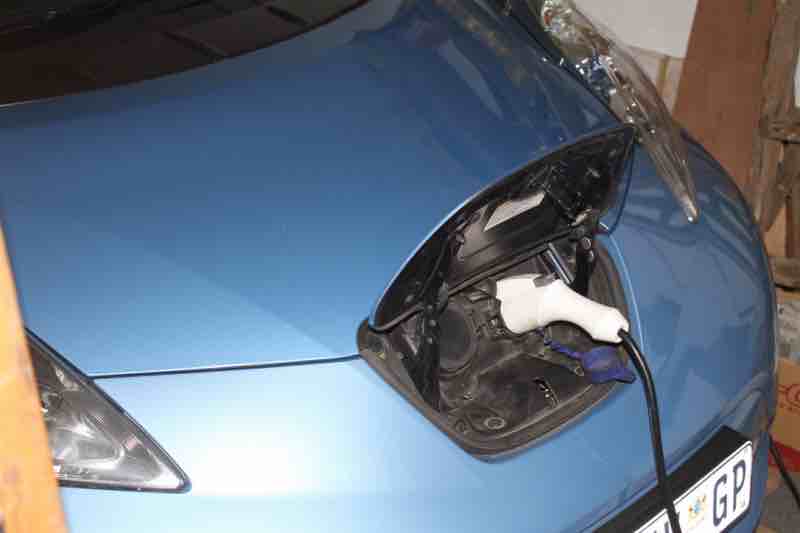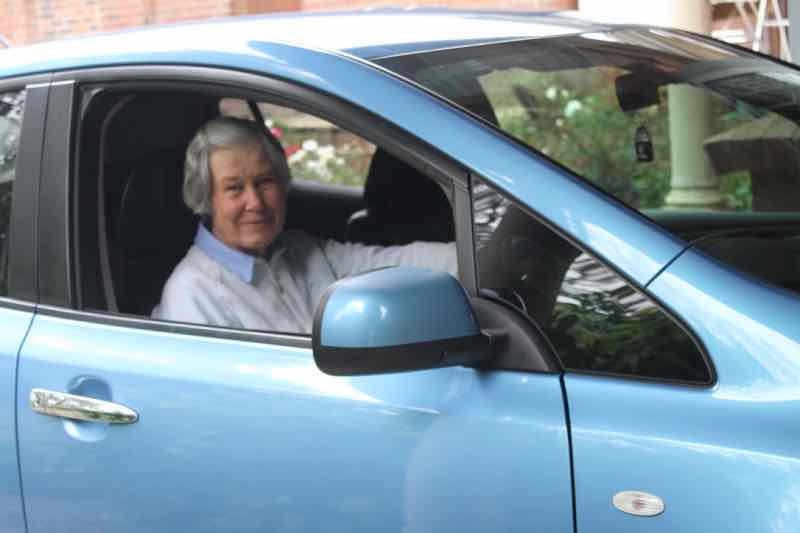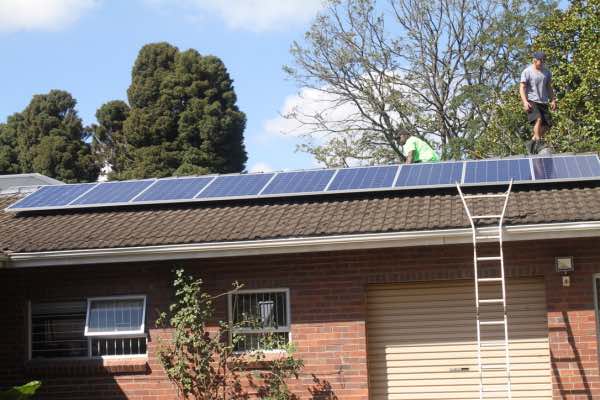- Homepage
- Our green solar power
- The E-car Has Landed
The E-car has landed
The E-car has landed in the world with a thump but until there are some serious changes in the thinking of politicians, they will not thrive in South Africa; until the very recent past there were less than 1,000 pure battery electric vehicles.
Sales began to surge in 2024 but remain predominantly in the hybrid sector[2].
The E-car has landed in South Africa, the "Daily Maverick’s number one of the best rides of 2019;" and by good fortune a Nissan Leaf in our own garage. However, the two vehicles are like chalk and cheese. The former is top of the range and very expensive; the other rather old but with a new lithium-ion battery.
Now that the batteries have improved in leaps and bounds, E-cars are without a doubt, as certain as digital cameras, the future. Mind you, we said that about Kindle books too; paper backs and hard covers are still very much with us.
Quick guide
More detail

Turning over a blue leaf was our first step into 2019; a wonderful start to the new year. It has become a hugely important jump in our green journey.
E-cars have not taken off in South Africa and no one is sure if they ever will. The government was clearly against them in stark contrast to Europe’s latest Green Deal; new measures will make fossil fuel vehicles very expensive in the near future.
But in South Africa all E-cars are declared luxury vehicles; they attract a 40% import duty, making them impossibly expensive for the man in the street. Only 94 were sold in the whole of 2020.
There is a new breath of air in government with a declared intention to invite investment in E-car manufacture but until that luxury tax is removed it remains pie in the sky for the man in the street.
Load shedding and fuel levies
Why is that? Well, one can only speculate but I have to presume that Eskom’s woes are top of the list. If there was a sudden flood of E-cars on the market, demand for electricity would rise, increasing the likelihood of load shedding.
And secondly every litre of petrol or diesel we purchase contributes over R10 to the General Fuel Levy; the average car pays about ten-thousand rand directly to the state coffers every year.
Included in that is over R2 for the Road Accident Fund and 10c a litre for the carbon tax; the government will be losing much revenue whenever someone buys an E-car.
In short every time you filled up your 50 litre tank in 2021 you were contributing nearly R500 to the state.
We personally used to top up on about 20 occasions in a year which meant a saving of nearly R6,000 in 2019. The government did not like that, I'm sure.
Servicing costs
Servicing of an E-car costs less than R1,000 per annum. There are so few moving parts in comparison; no oil, spark plugs or air filters. And the regenerative braking, charging the battery instead of wearing out the pads, means less maintenance too.
Servicing of our E-car came in 2021 to a princely zero; virtually nothing needed doing.

But then of course there is the battery. Right now that is guaranteed for seven years but the new Tesla lithium-ions are expected to last a million miles. It is a huge unknown but expect replacing it to be costly to pay for all the research and development.
Motor vehicle companies make a lot of their money out of repairs and maintenance; with the loss of that income from electric cars, they have gone the route of giving them all the bells and whistles, making them extremely expensive. The Jaguar I-Pace costs a cool R1.6 million.
Our Nissan Leaf is now eleven years old, has few frills but a new battery; and has a range of about 160km, as compared to the Jaguar with an expected 450 kilometres; we will not be driving to Cape Town. But both of them get huge Eco-cred.
I am not in the Jag, Merc or BMW league. Our car has to pay its way whilst contributing to a greener planet; best of all the battery will be charged by the excess power from our solar farm.
Thanks to government policy there were less than 1000 E-cars in SA until very recently; we are privileged to have one of them. We will keep you updated in the months ahead as to whether it was a totally ludicrous idea or not; a battery capable of delivering 300 km would be nice.
Three years after the E-car has landed I can confirm that this is by far the nicest vehicle to drive that I have ever owned; I will never go back to fossil fuel.
In 2025 my opinion has not changed; but the range of the 6-year old, ancient battery technology is now only 100km. It's the perfect round the block car; but totally unsuited to cross country travel.
E-cars in New Jersey
And finally an article on New Jersey's planned bill for E-car incentives, gleaned from the press by an American cousin.
There will be a NJ tax incentive up to $5000, in addition to a federal rebate which is roughly the same amount based on the car's battery capacity; that gives a total of ten thousand dollars.
State sales tax will continue to be waived. Consumers would get a $25/mile rebate of the eligible vehicle's electric-power range, up to a maximum of five thousand dollars for cars with a sticker price of 55,000 or less.
They mention the base price of all E-cars will be in the range $30,000 to 35,000.
A consumer report states a Chevy Bolt with a 200-mile range started around $37,000 in 2021. The one they tested got 250; it depended on how fast you drove.
They talk about range-anxiety; folks worry about running out of juice. That is why hybrids are so popular; they are giving rebates for them too but much less.
NJ had 26,000 E-cars at end of 2018 (7th in US) but last in the number of charging stations; that will be remedied by the bill too.
They want 827 new stations.
The new Nissan Leaf has a price-tag of $27,400 in the USA[1] and was below 20,000 after tax rebates in 2021; about R340,000.
The E-car has landed in South Africa
The E-car has landed in South Africa but it is having a bumpy ride. It remains a luxury for the tiny minority of greenies who are committed to the future of the planet; and are relatively wealthy. We were just lucky pick up a clean secondhand vehicle with a new battery.
The Coronavirus has just added a new dimension. It thrives in those parts of the world where there is very high air-pollution. It is estimated in our city by the authorities that motor vehicles cause 89% of that smog; and many deaths.
There are at least 20,000 deaths in South Africa every year from air pollution; that is relatively low by world standards. If more E-cars landed it would start saving a lot of lives from heart and lung conditions.
Solar farm and E-cars

Building a solar farm on your roof or in your garden is the future in South Africa; and in much of the world. With our new inclination for reliable green energy it is the way to go.
It will certainly pay its way.
Our solar powered generator has been astonishingly successful but not without its hiccups.
It only came about after we started saving for a solar farm; the capital expenditure is significant but the return amply justifies the investment. For that matter a sinking fund for your first E-car is also the way to go.
When browsing use right click and Open Link in New Tab, or you may get a bad gateway signal.
The material expressed on this page is gleaned from the nutritional and environmental literature; it is clearly referenced. A plain distinction is made between the author's opinion and that which is scientifically proven. When in doubt consult your health professional.
To suggest a correction or clarification, write to Dr Bernard Preston here. Contact.
Newsletter
Our newsletter is entitled "create a cyan zone" at your home, preserving both yourself and Mother Earth for future generations; and the family too, of course. We promise not to spam you with daily emails promoting various products. You may get an occasional nudge to buy one of my books.
Here are the back issues.
- Lifestyle and ideal body weight
- What are ultra-processed foods?
- Investing in long-term health
- Diseases from plastic exposure
- Intensive lifestyle management for obesity has limited value
- A world largely devoid of Parkinson's Disease
- The impact of friendly bacteria in the tum on the prevention of cancer
- There's a hole in the bucket
- Everyone is talking about weight loss drugs
- Pull the sweet tooth
- If you suffer from heartburn plant a susu
- Refined maize meal and stunting
- Should agriculture and industry get priority for water and electricity?
- Nature is calling
- Mill your own flour
- Bake your own sourdough bread
- Microplastics from our water
- Alternative types of water storage
- Wear your clothes out
- Comfort foods
- Create a bee-friendly environment
- Go to bed slightly hungry
- Keep bees
- Blue zone folk are religious
- Reduce plastic waste
- Family is important
- What can go in compost?
- Grow broad beans for longevity
- Harvest and store sunshine
- Blue zone exercise
- Harvest and store your rainwater
- Create a cyan zone at your home
Did you find this page interesting? How about forwarding it to a friendly book or food junkie? Better still, a social media tick would help.
- Homepage
- Our green solar power
- The E-car Has Landed
Address:
56 Groenekloof Rd,
Hilton, KZN
South Africa
Website:
https://www.bernard-preston.com